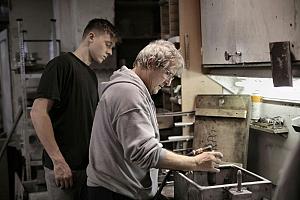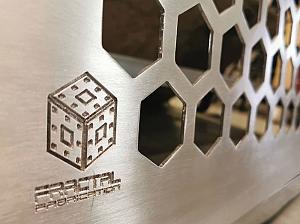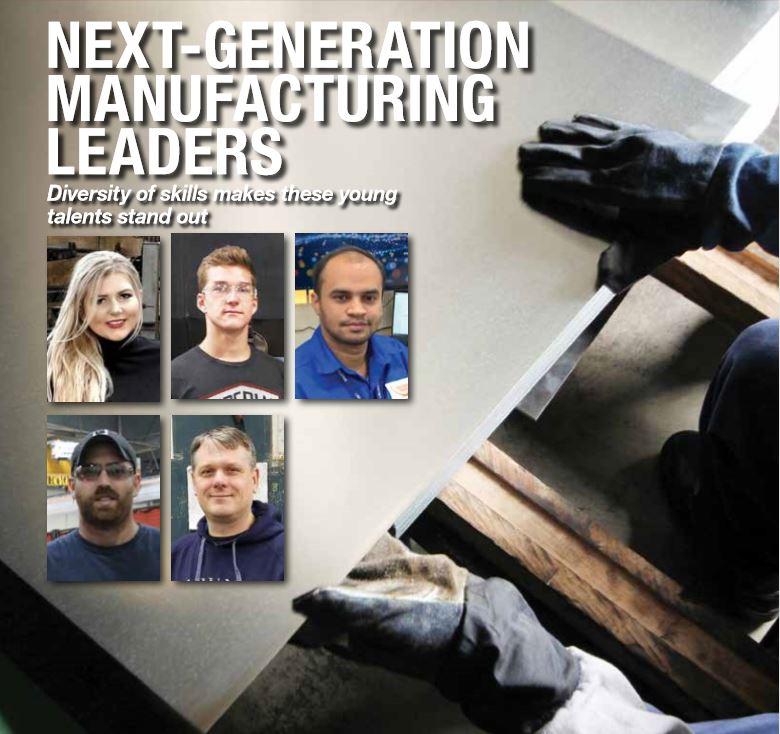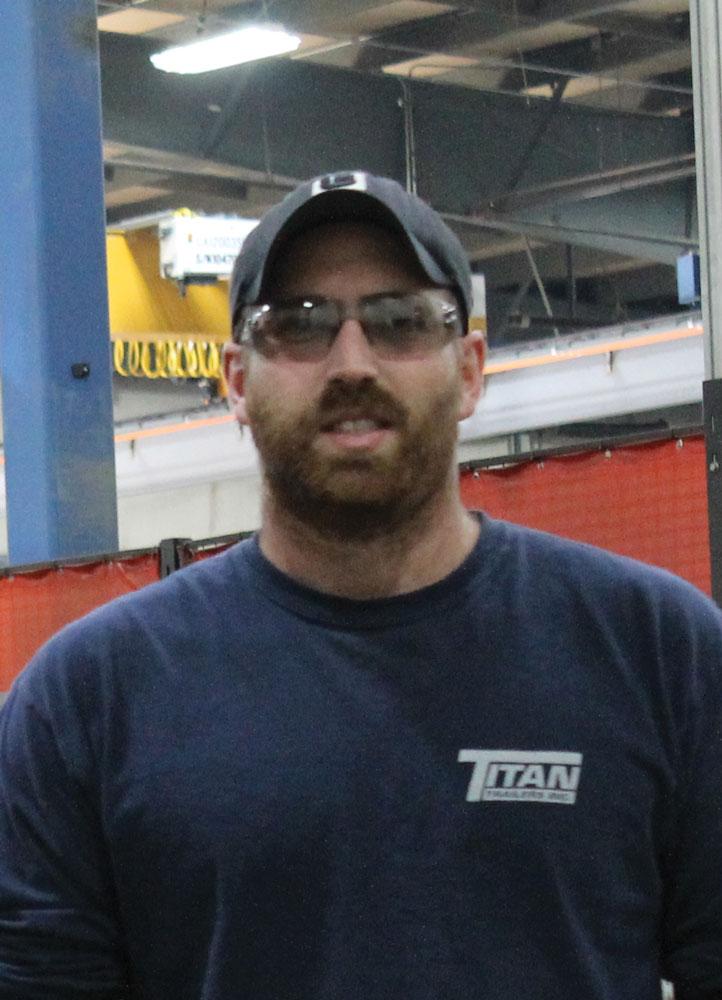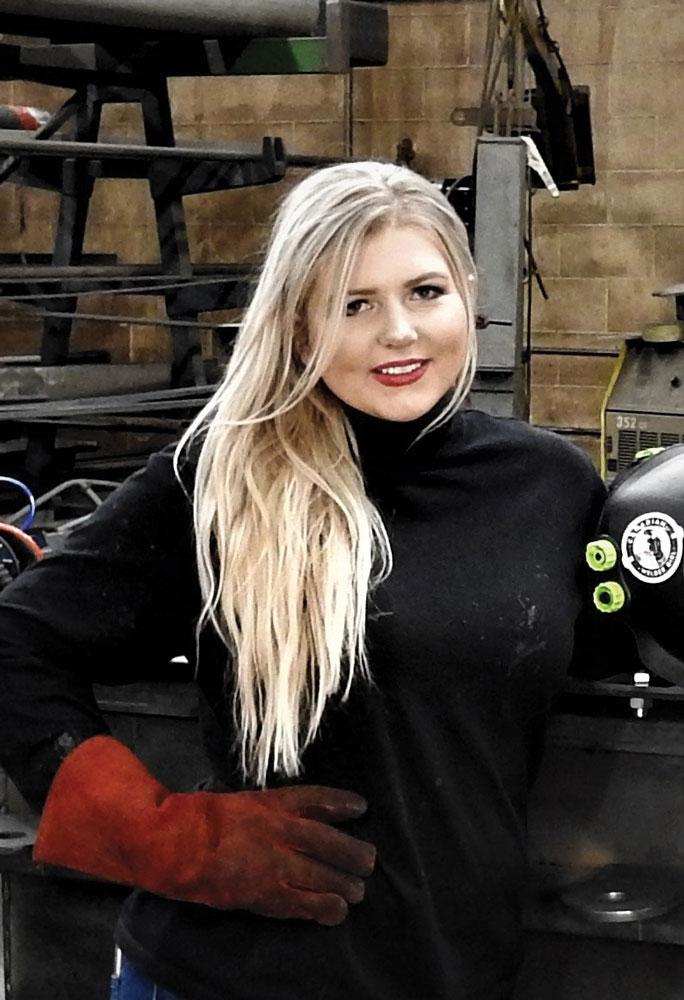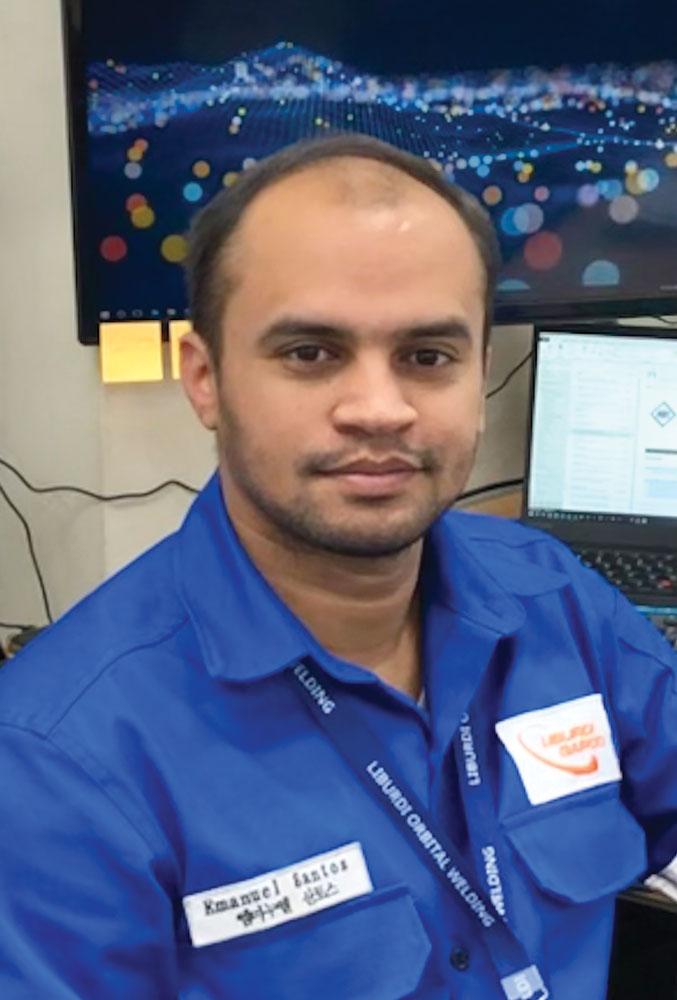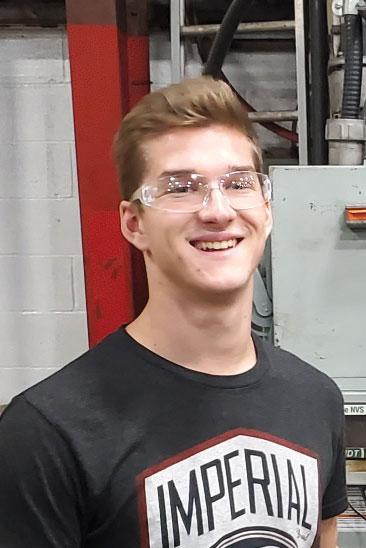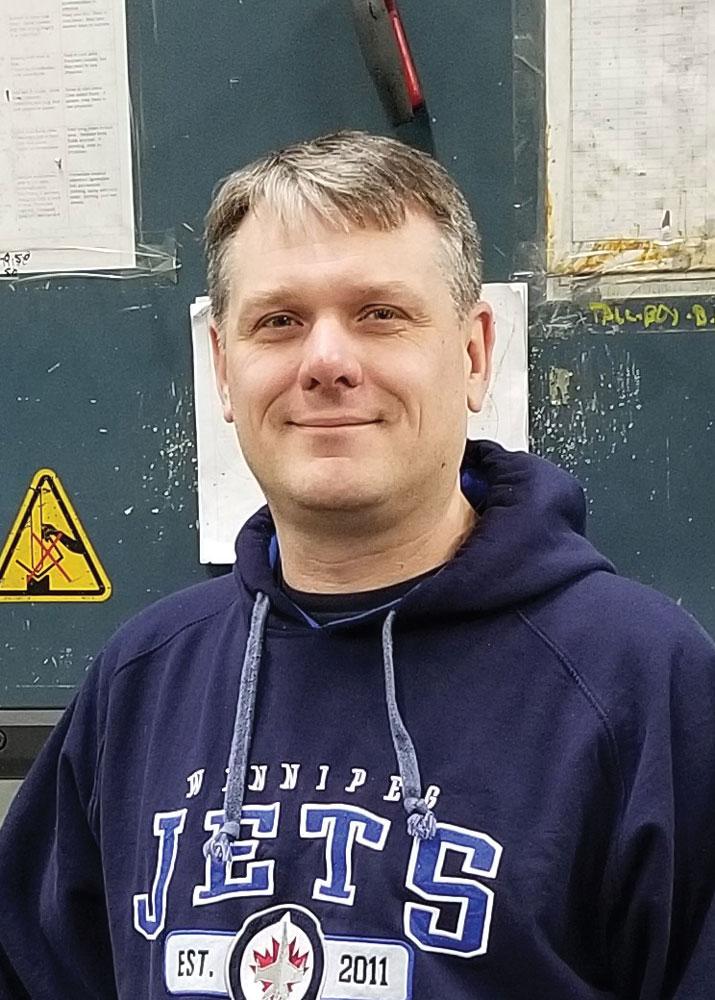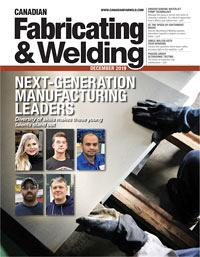Editor
- FMA
- The Fabricator
- FABTECH
- Canadian Metalworking
Next-generation manufacturing leaders 2019
Diversity of skills makes these young talents stand out
- By Rob Colman
- December 20, 2019
- Article
- Fabricating
Last year we introduced our Next-Generation Manufacturing Leaders recognition program to highlight younger people in the industry who, through their talents and their willingness to share their knowledge, are demonstrating a commitment to growing and improving Canada’s manufacturing backbone.
This year we celebrate five more fabricating and welding specialists nominated by colleagues in the industry. They are a business owner, a robotics specialist, a welding engineer, a millwright, and a welder. What stood out to me among the nominees was their thirst for knowledge. Regardless of where they are in their career, each is aware that there is more to learn and greater heights to achieve.
It’s with this diversity of skills and enthusiasm that the future of manufacturing is being built in Canada. We look forward to watching all these individuals develop further in the future.
Tom Pursley
Lead Robotics and Automation Integrator
Titan Trailers
Tom Pursley started his career at Delhi, Ont.-based Titan Trailers in 2004 as a high school co-op student with a welder-fitter placement. It was while watching the senior welder-fitters then that he knew the trades were something he wanted to pursue.
“My dad owns a paving company that was started by my grandfather 75 years ago,” said Pursley. "My summer vacations were spent helping him. I grew up around machinery; we were always in the shop doing our own repairs. I knew some of the basics of welding, and I really enjoyed welding classes in high school. Back then I didn’t know what I was going to do, and didn’t really enjoy school, so when I found out I could do a co-op for a couple credits and spend half the day in a shop, I jumped at the chance.”
The experience was an eye-opener.
“I thought I knew how to weld. When I got here, I realized I had a lot to learn. But that’s what sparked me. I spent a lot of time on that co-op just sweeping and cleaning because they wouldn’t let me weld on a trailer yet. But I remember I worked hard, and though a lot of the guys laughed at me booking it, the boss saw the work ethic. He kept giving me opportunities to do more and learn more. I kept taking it and doing my best. Just having a good attitude was a big part of how I moved up.”
Pursley learned the basics of GMAW during his co-op and became fascinated with learning to read blueprints. Once he had a goal in mind, he applied himself to reaching that goal. He joined the company as a welder-fitter apprentice after high school, and a year later attended night school at Fanshaw College to learn the fundamentals of AutoCAD. In 2007 he enrolled in the mechanical engineering technical program at the same college. Titan Trailers brought him into its R&D department when he graduated.
“Titan had just bought its first weld cell, a turnkey from Motoman, and they hired a guy to get us set up,” said Pursley. “He knew everything about robots, but he wasn’t a welder, so I was given the task of working with him to ensure the rollout went smoothly. That experience was great. I looked at it as one more challenge and jumped at it. After about three months they put me in charge, and I’ve been in charge ever since.”
Titan Trailers keeps Pursley busy automating welding processes wherever possible. According to him, the company still has 15 robots in storage waiting to be commissioned for the type of work the company does. Pursley enjoys the challenge of making systems that will help simplify processes.
“I built some custom automated seam welders that will weld nine panels together in one shot,” he said. “It’ll do a 53-ft. weld, all eight welders running at one time. That builds our sidewalls. Then we robotically weld all the fifth wheel couplers, on tipper trailers we do the entire floor and the subframe assemblies, we do our own custom steel steerable lift axle. We do all that using automation, but there’s still a lot of hand welding done once the trailer is put together because we’re a custom trailer shop and every trailer and every order is different. We try to standardize as much as we can, but really we would be programming more than we would be welding if we automated everything.”
Automation isn’t always about efficiencies at Titan, though.
"Some things that the boss wants done on the robot, I say it’s going to be quicker to do by hand. But as he explains, some jobs aren’t nice for someone to have to do – the work might involve exposure to lots of fume, or a job that’s difficult to do safely. Our mentality is to take guys away from the fume and away from hazards when we can.”
Pursley characterizes Titan as a “robotic job shop” because of all the custom work they do. The automation team now has its own 26,000-sq.-ft. facility for preparing robotic systems for its other two facilities. Pursley continues to grow his own skill set while working on many projects.
“The biggest thing for me is just trying to learn and know more about advanced code writing,” he said. “I’ve been able to develop subroutines, making things easier to do. I’m almost at the point where I can pretty much make a robot program itself using tactile touch sense. My vision is simplifying the job for the welder on the floor.”
Pursley gets involved in promoting the trades whenever he can, talking to high school and college students about his journey.
"I tell them my story so they understand how it can work. Although I wasn’t a keen student in high school, once I knew what I wanted and went to college for mechanical engineering, I got straight A’s because I wanted it. I wish I had known that a little bit sooner.”
When it comes to automation, Pursley insists that someone trained as a welder is usually better suited to program than someone trained in robotics.
“It’s easier to take a welder and teach him to program than the other way around,” he said. “The best programmers I’ve seen are really good welders with lots of experience. They just know the angles and the offsets, different thicknesses, and the other things you have to compensate for when going into a weld.”
Alicia Butty
Shop Supervisor
Butty Manufacturing
Like many people in the trades, Alicia Butty grew up in and around the family business, Butty Manufacturing, a business first started by her grandfather and now run by her father and uncle in Ancaster, Ont.
“I was always interested in manufacturing and developed an interest in metal art being around dad’s shop,” said Butty.
Despite her inclination for welding, Butty was encouraged to pursue a university degree. But after two years working toward a communications degree, she realized she’d much rather be welding. At that point she started a welding course at Mohawk College and hasn’t looked back.
Butty was hired by Vulcraft Canada and spent the first two and a half years of her career there, welding joists and joist girders, and training up for her welding inspector level 1 ticket.
“When I left the company, I was the only inspector in the shop, which meant I inspected work and did minor repairs,” said Butty.
While at Vulcraft, however, Butty was also pursuing her interest in metal art, spending nights and weekends at her dad’s shop on work made from scrap metal that fed her creative spirit. This has included a pair of angel wings that were used in a shop-front display during the Christmas season last year, as well as the production of logos and signs for a series of local businesses.
Young talents bring their own skill sets and enthusiasms to every job, and Alicia Butty is no exception. She has taken what she learned in communications and put it to good use promoting her art via Instagram, @canadian_welder_girl, and her website, canadianweldergirl.com. On Instagram she has more than 40,000 followers, which has drawn interest from the likes of FABTECH and CWB Group. This year she was interviewed as part of CWB’s Women of Steel promotion and was invited by FABTECH to be an “influencer” to walk the show and capture it for her Instagram audience.
In November Alicia Butty joined the family business in her new role as shop supervisor. As she explained, it was the right time for a change.
“Vulcraft was a great experience for me, but as a company that produced essentially the same product using primarily MIG welding, there weren’t a lot of opportunities for me to learn new welding skills,” she said. “At Butty Manufacturing, we do everything – TIG, MIG, stick – and the jobs vary depending on the day of the week.”
Butty Manufacturing makes its own tire cutters for recycling truck tires and band saws. It also does plenty of custom work for other companies.
“For instance, right now they’re working on parts for airplane landing gear,” said Butty. “The variety gives me room to grow, and I can take time after work to develop other projects in the shop also.” Not only is Butty bringing her welding skills to the shop, but she also hopes to use her communications skills to expand the company’s profile. At the same time she hopes to learn more about product design from her father and uncle.
As for her welding development, Butty hopes to soon get her supervisor ticket and her weld inspector level 2.
Asked what needs to be done to attract more young people to the trades, Butty doesn’t hesitate with an answer.
“We need to promote it more,” she said. “Welding looks like a tough, dirty trade when you first see someone in a shop, but it really isn’t that bad.”
Butty’s doing her part in this promotion, participating in outreach to high school students close to home in Ancaster, Ont.
“I think one thing that young welders have to understand is that people are going to doubt your skills when you first start,” she said. “A lot of people doubted me when I first started, but then they saw the quality of my welds. That’s where you prove yourself.”
Emanuel dos Santos
Welding Engineering Specialist
Liburdi GAPCO™, a Division of Liburdi Automation Inc.
Emanuel Santos has worked for Liburdi Automation Inc., Dundas, Ont., in its GAPCO division since May 2017, after graduating with a master’s degree from the University of Waterloo. He has worked on the development and improvement of welding procedures for the oil and gas and nuclear industries.
In his short career so far, Santos has been involved in Bruce Power’s major component replacement program in Ontario, at North West Redwater Sturgeon Refinery in Alberta, and is currently in South Korea supporting the welding of the sour gas injection lines for the Future Growth Project-Wellhead Pressure Management Project (FGP-WPMP). This piping system, using state-of-the-art sour gas injection technology, is to be installed in Kazakhstan for expansion of oil production for Tengizchevroil LLP (TCO).
Santos came to welding by chance in his undergraduate studies in Brazil.
“When I was in my undergrad I wanted to do research, and the welding lab was the one with open positions” he said. “My professor said, ‘I have some projects and challenges and we need people.’ When I started getting to know what was involved in welding, I thought, wow, it is so complicated. There is so much that I need to know in order to understand the different welding processes. It was challenging. It didn’t mean just learning about how to join metal, but also materials science, thermodynamics, fluid mechanicals and electromagnetics, and how all these fields would be interrelated to govern the welding phenomenon and transformations that the different materials undergo during the joining process. It was amazing. I liked that I had to grasp concepts from many different fields to fully understand the process. And then from a practical perspective, there’s always going to be a need for the technology.”
In Santos’ fourth year of undergrad university he was awarded a scholarship to come to Canada for 16 months to study at University of Waterloo, where he first had the opportunity to work with Adrian Gerlich, associate professor, NSERC/TransCanada Industrial Research Chair in Welding for Energy Infrastructure, Department of Mechanical and Mechatronics Engineering, University of Waterloo.
“That was my first opportunity to use Liburdi’s equipment,” said Santos. This initial undergrad experience eventually led him to accept the opportunity to do his master’s work at Waterloo. His master thesis focuses on understanding the influence of current pulse profile on metal transfer in pulsed gas metal arc welding (GMAW-P), using a specialized power supply developed by Liburdi Engineering. This work was later used by Liburdi for commercial arc welding services as well as through welding service at its GAPCO division.
Santos has travelled internationally, presenting findings from his work during his master’s studies.
“When I started my research and developed connections in the community, I was very impressed by the support that our lab had, from the university and from industry. I wanted to do work that industry could use, and Professor Gerlich encouraged that. He said, ‘It’s your time, do what you want with it, enjoy yourself.’”
Ultimately, though, he wanted to be hands-on and explore how industry would make use of the concepts and experience developed through his years of studies and research. That led Santos to his current position at Liburdi.
He’s candid about his connection to welding: “Welding’s not easy; you don’t choose it, it chooses you.”
Perhaps this quote explains the great respect Santos has for the many tradespeople he works with.
“The knowledge they provide is great. If you’re able to listen to what the tradespeople on-site have to say, you can more easily create procedures that are going to meet specific project requirements. You have to respect that knowledge. Science is essential, but consultation is key too. You can’t succeed without working as a team of people with different skill sets from yours that complement your knowledge.”
Cooper Kelly
Millwright
Shur Lok Products
You’d think that as the youngest person in this year’s Next-Generation Leaders selection, Cooper Kelly would be among the least experienced. However, he’s been welding since the age of nine when, using scrap metal from the family business, Shur Lok Products, Windsor, Ont., he MIG welded an 18-in.-tall replica of the CN Tower.
Kelly’s enthusiasm for the trades never flagged. During high school he received extra credits doing repairs to school equipment, such as chairs, tables, teachers’ cars – basically whatever needed to get fixed. In grade 10 he manufactured a steel clock using an old clutch plate for one of his teachers.
Perhaps even more remarkable, Kelly took it upon himself to teach others.
“I was in the Ontario Youth Apprenticeship Program (OYAP) in high school, working at Shur Lok and earning high school credits at the same time,” said Kelly. “While I was doing that, we had some Korean exchange students who went to a local high school for two months to learn English and then came to work with me at our shop for two months. The first time was when I was in grade 11, and the second time was last year. I taught them the basics of welding, torch cutting, and basic fabrication in general – letting them get their hands dirty in a way they had never had a chance to do at home because they didn’t have diversified maintenance training.”
After high school Kelly chose to pursue a millwright apprenticeship – a switch from the general machinist program he’d started working towards with the OYAP program.
“I liked the idea of the variety the millwright apprenticeship would give me,” he said. “I like doing all kinds of things rather than just running a mill or a machining centre all day. I was already all over the plant anyhow, doing whatever needed to be done.”
Cooper’s dad Kevin, vice-president of sales and engineering and owner of Shur Lok, said that now that he’s completed his Red Seal millwright and is a journeyman at 21 years old, he has become the plant "MacGyver" to even the veterans with many years of experience.
“Even during his two years at college, Cooper had become a mentor to individuals in his class who were much older and were in school for retraining for a new career,” said Kevin. “He would stay late after class and help others to understand how to complete a project for class or to help them understand the material. He passed his exam on the first try with flying colours and is now an invaluable asset to our company. He is rebuilding most equipment in the plants and has become proficient at troubleshooting any piece of manufacturing equipment. He can completely tear down a press and rebuild it.”
Shur Lok Products specializes in production welded assemblies and metal stamping for the automotive industry. Cooper hopes to gradually move up the management ladder. It’s something his dad has been encouraging for many years.
“Even as a high school student, I would occasionally take him to meetings with clients so he could sit and take notes and get a feel of how things progressed,” said Kevin. “On the drive home from wherever the meeting might be, we’d talk about how it worked – when it was important to listen to the client, when to speak, that kind of thing.”
Right now Cooper continues to absorb all he can from the people around him.
“I’m just trying to diversify my skills as much as I can, learning the ins and outs of the business,” he said.
Asked how he thinks we can encourage more people to enter the trades, he said the important thing is to be an example to others.
“I’ve got a few of my friends into the trades just by having them come do some work with me,” he said. “When they’re able to get their hands dirty in the shop, they realize they like doing it.”
Chris Kroeker
Owner/Manager
Western Machine Works
Chris Kroeker has witnessed changes in the industry growing up in his father’s businesses. In 1980 his father purchased Western Machine Works, Winnipeg, Man., which was primarily a machining company, with partner Peter Kampen. In the late 1980s the company picked up a contract to make exercise equipment, and over time the fabrication and assembly of that equipment became the shop’s primary focus – so much so that the business rebranded itself as Pulse Fitness Systems. However, around 2007 the company began to get squeezed out of the manufacturing side of the business due to overseas competition in that niche space. By 2009 Pulse Fitness was no longer making exercise equipment, and the manufacturing arm of the company took the Western Machine Works name again, but now with a focus on fabricating instead of machining. To boost the capabilities they already had, they purchased a small, local fabricating company.
Kroeker began transitioning into the role of manager about seven years ago and has been in charge for the past five years. He experienced a substantial amount of the change the company has been through, having been part of the company since he was old enough to work.
“I started sweeping floors for summer jobs. Later on I worked the saw and the drill press, and gradually worked my way up to assembling exercise equipment,” said Kroeker. “Then I took over quality control of that, and eventually, as the exercise equipment was being phased out, became shop supervisor.”
Kroeker learned all of his fabricating skills on the shop floor and attended Red River College for business administration to ensure he could handle both the shop and the front office.
Change is probably the biggest challenge that anyone faces in developing a career, and Kroeker has experienced an abundance of it to get Western Machine Works to the stable, steady place it is today.
“We have a wide variety of customers, and not one accounts for more than 20 per cent of our work, which gives you an idea of how the work is spread out,” he said. “One of our bigger customers has us build the propane tank exchange cages you see at gas stations. Another has us building larger electrical enclosures. A third has us making parts for construction heaters. The variety we do is pretty broad.”
One of the remnants from the exercise equipment business is the company’s powder coating system, which is a great selling point for some customers.
“We needed to carefully control our painting processes for that product line, and it was a large product to have to try to send out for powder coating,” said Kroeker. “While a lot of our business is fabricating carbon steel, we do a little more business on the coating side for aluminum parts.”
Kroeker has about 15 people in the shop now, and just three in the office full-time.
While he has already proved that he can run a successful fab shop, Kroeker is looking at ways to improve efficiencies through better process control.
“Having the right people around you obviously helps you a lot,” he said. “Just recently my brother-in-law joined the company, bringing with him more corporate experience and a strong understanding of process controls. I think that’s the missing piece we were looking for. While I am good at managing customers, and I understand the shop, having grown up in fabricating, managing overall processes and part flow is something that he can really help with.”
A big transition for Kroeker from being a good, skilled team member to being a leader has been letting go of some control and training his team in such a way that they feel confident to make decisions without his supervision.
“It was hard for me to let go of control like that, but it was also very important,” he said. “I feel like we’re still not quite where I want us to be in terms of the structure and part flow in the shop, but we are getting there.”
Part of the key to this improvement has been keeping employees in the shop. For instance, the shop supervisor is someone who developed through the ranks of the company and still likes to run the machines but is comfortable also managing staff.
“I think we do pretty well keeping our guys,” said Kroeker. “We try to be accommodating with their needs as far as flexible hours go, and we encourage our guys to take ownership of the work they do. It’s a competitive market but we seem to be handling staffing well.”
Kroeker jokes about “reluctantly letting go of micromanaging,” but ultimately appears open to sharing with the people he works with to make everyone more successful.
“I try to teach whatever I know, and I don't hold anything back,” he said. “The more someone in your plant knows, the better decisions they’ll make for themselves and the whole team.”
Editor Robert Colman can be reached at rcolman@canadianfabweld.com.
About the Author

Rob Colman
1154 Warden Avenue
Toronto, M1R 0A1 Canada
905-235-0471
Robert Colman has worked as a writer and editor for more than 25 years, covering the needs of a variety of trades. He has been dedicated to the metalworking industry for the past 13 years, serving as editor for Metalworking Production & Purchasing (MP&P) and, since January 2016, the editor of Canadian Fabricating & Welding. He graduated with a B.A. degree from McGill University and a Master’s degree from UBC.
subscribe now


Keep up to date with the latest news, events, and technology for all things metal from our pair of monthly magazines written specifically for Canadian manufacturers!
Start Your Free Subscription- Trending Articles
BlueForge Alliance partners with Nuts, Bolts & Thingamajigs to develop Submarine Manufacturing Camps
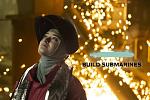
Portable system becomes hot tech in heat treatment
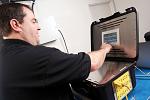
Orbital tube welding webinar to be held April 23
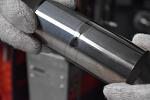
Cidan Machinery Metal Expo 2024 to be held in Georgia May 1-2
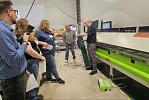
Corrosion-inhibiting coating can be peeled off after use

- Industry Events
MME Winnipeg
- April 30, 2024
- Winnipeg, ON Canada
CTMA Economic Uncertainty: Helping You Navigate Windsor Seminar
- April 30, 2024
- Windsor, ON Canada
CTMA Economic Uncertainty: Helping You Navigate Kitchener Seminar
- May 2, 2024
- Kitchener, ON Canada
Automate 2024
- May 6 - 9, 2024
- Chicago, IL
ANCA Open House
- May 7 - 8, 2024
- Wixom, MI





